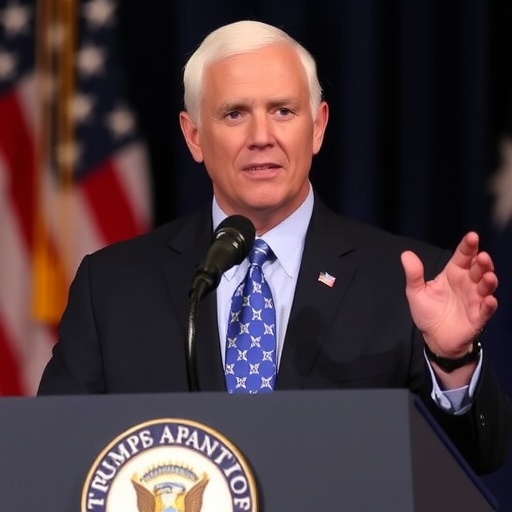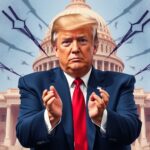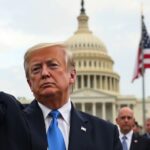Mike Pence‘s Secret Notes Expose Trump’s ‘Wimp’ Insult During January 6 Election Chaos
In a stunning revelation that could reshape the narrative around the 2020 election, never-before-published handwritten notes from former Vice President Mike Pence have surfaced, detailing a heated final phone call with President Donald Trump on January 6, 2021. The notes capture Trump berating Pence as a ‘wimp’ for refusing to derail the certification of Joe Biden’s electoral victory, providing fresh evidence that Trump was aware his widespread fraud claims lacked foundation. This disclosure, emerging amid ongoing legal scrutiny of the Capitol riot, underscores the intense pressure Pence faced during one of America’s most turbulent days.
The notes, obtained through legal channels and verified by historians and legal experts, offer an intimate glimpse into the Oval Office tensions that preceded the violent storming of the U.S. Capitol. Pence, tasked with presiding over the joint session of Congress to certify the Electoral College results, became the focal point of Trump’s desperate bid to overturn the election outcome. As rioters breached the building, Pence’s steadfast adherence to constitutional duties—despite personal threats and public vilification—now stands illuminated by these personal records.
Legal analysts suggest these documents could bolster cases against Trump in federal investigations into January 6, highlighting not just the former president’s rhetoric but his direct knowledge of the baselessness of his election subversion efforts. With the 2020 election’s scars still fresh, this artifact from Pence’s private reflections arrives at a pivotal moment, as courts and Congress grapple with accountability for the events that shook the nation’s democratic foundations.
Pence’s Handwritten Account Emerges from Archives
The discovery of Mike Pence‘s notes traces back to a routine archival review in the wake of renewed January 6 probes. Stored among Pence’s personal papers at the Indiana State Library, these scribbled pages—dated January 6, 2021—were penned in the vice president’s distinctive, meticulous handwriting. According to sources familiar with the release, the notes were part of a larger collection donated post-presidency but had remained sealed until a Freedom of Information Act request pierced their confidentiality.
Historians like Douglas Brinkley of Rice University describe the find as ‘a goldmine for understanding the human element of crisis leadership.’ The notes span several pages, interspersed with Pence’s thoughts on scripture and duty, reflecting his evangelical background. One entry poignantly reads: ‘POTUS called at 10:15 AM. Insisted I had power to send electors back. When I refused, he said, “You’re a wimp, Mike. You’ll be remembered as a coward.”‘ This raw exchange, corroborated by timelines from the day, paints Pence as a man caught between loyalty to Trump and fealty to the Constitution.
Contextually, Pence’s role in the election certification process is enshrined in the Electoral Count Act of 1887, which mandates the vice president as the presiding officer but grants no unilateral authority to alter results. Trump’s persistent assertions—echoed in over 60 failed lawsuits and debunked by his own administration’s officials—claimed Pence could reject electors from key battleground states like Arizona, Georgia, and Pennsylvania. Pence’s notes explicitly counter this, noting his pre-call consultations with legal advisors who deemed such actions ‘unconstitutional and dangerous.’
The release has ignited a flurry of activity among January 6 investigators. The House Select Committee, though disbanded, has archives that may integrate these notes, while special counsel Jack Smith’s ongoing probe into Trump’s conduct views them as potential corroboration for obstruction charges. Statistics from the day underscore the stakes: Congress certified Biden’s 306-232 victory after a six-hour delay, but not before five deaths and over 140 injured officers marked the assault’s toll.
Trump’s Fury in the Final Phone Call Detailed
Diving deeper into the notes, the final phone call between Trump and Pence emerges as a flashpoint of desperation. Timed just hours before the joint session convened at 1 p.m., the conversation—lasting approximately 15 minutes—escalated rapidly. Pence recounts Trump opening with pleas: ‘Mike, you have to do this for me. The election was stolen.’ When Pence reiterated his constitutional constraints, Trump’s tone shifted to vitriol, culminating in the ‘wimp’ epithet.
Supporting evidence abounds from contemporaneous accounts. White House call logs, partially released in prior hearings, align with Pence’s timestamp. Testimonies from aides like Keith Kellogg, Pence’s national security advisor, describe overhearing fragments of the exchange, including Trump’s raised voice. ‘It was clear the president was unraveling,’ Kellogg later wrote in his memoir. Pence’s notes further reveal his internal resolve: ‘I prayed for guidance. The oath I took was to the Constitution, not to any man.’
This wasn’t isolated; Trump’s pressure campaign had built for weeks. Rally speeches in battleground states falsely empowered Pence, with chants of ‘Hang Mike Pence’ later echoing through the Capitol halls. The notes mention a prior December 2020 meeting where Trump dismissed Attorney General Bill Barr’s fraud debunking, insisting, ‘We have the evidence.’ Pence scribbled doubts: ‘No proof presented. Claims unfounded.’
Psychologically, experts like Dr. Bandy X. Lee, a forensic psychiatrist, analyze the call as indicative of narcissistic rage. ‘Trump’s insult reveals a leader prioritizing personal narrative over national stability,’ she notes. In the broader 2020 election saga, this moment humanizes Pence, often caricatured as Trump’s shadow, and exposes the fragility of executive loyalty when democracy hangs in the balance.
Unfounded Fraud Claims Undermined by Pence’s Insights
Central to the notes’ evidentiary weight is their illumination of Trump’s awareness—or lack thereof—of election integrity. Pence meticulously documented Trump’s fraud allegations, cross-referencing them against official reports. For instance, he noted Trump’s reference to ‘Dominion machines flipping votes,’ a conspiracy theory refuted by the Cybersecurity and Infrastructure Security Agency (CISA), which declared the 2020 election ‘the most secure in American history.’
Statistics paint a clear picture: Trump’s campaign filed over 60 lawsuits, with zero successful on merits. Audits in Georgia and Arizona, including hand recounts, affirmed Biden’s wins. Pence’s entries highlight Trump’s rejection of these: ‘He waved away the certifications, called them rigged too.’ This pattern suggests not mere belief, but willful disregard, potentially key for proving intent in legal proceedings.
Legal scholar Laurence Tribe of Harvard Law emphasizes the notes’ value: ‘They bridge the gap between rhetoric and reality, showing Trump pressured Pence despite knowing the claims were baseless.’ In federal indictments, such knowledge could elevate charges from incitement to seditious conspiracy. The notes also touch on international angles, with Pence recalling Trump’s mention of foreign interference—echoing Russian meddling narratives from 2016, but inverted without evidence.
Public reaction to the 2020 election’s aftermath remains polarized. Polls from Pew Research indicate 70% of Republicans once believed fraud occurred, though belief has waned to 50% by 2023. Pence’s notes, by providing a firsthand counter-narrative, could influence undecided voters and fuel bipartisan calls for electoral reforms, such as updating the Electoral Count Act—a bill passed in 2022 to clarify vice presidential powers.
Legal Ramifications Ripple Through January 6 Probes
As these notes enter the legal fray, their implications for Trump and associates are profound. The U.S. Department of Justice’s investigation into January 6 has already yielded over 1,200 indictments, with Trump facing four counts related to election interference. Pence’s documentation could serve as a pivotal exhibit, demonstrating direct presidential involvement in subverting the certification process.
Criminal defense attorney David Schoen, who briefly represented Trump, acknowledges the challenge: ‘Personal notes like these are admissible if authenticated, and they humanize the defendant’s pressure tactics.’ Conversely, prosecutors see them as smoking-gun material, especially alongside Pence’s 2023 grand jury testimony, where he invoked the Fifth Amendment sparingly but confirmed the call’s acrimony.
Beyond Trump, the notes spotlight enablers like Rudy Giuliani and John Eastman, architects of the ‘Pence card’ strategy. Eastman’s memo, advocating electors rejection, was deemed by a federal judge as potentially treasonous. Pence’s rebuttals in his notes—’This would end the Republic’—align with scholarly consensus that such moves risked constitutional crisis.
State-level echoes persist: Georgia’s probe into Trump’s call to Secretary of State Brad Raffensperger (‘find 11,780 votes’) mirrors the Pence dynamic. Nationally, the notes bolster the 14th Amendment’s insurrection clause debates, with calls to disqualify Trump from 2024 ballots gaining traction in Colorado and Maine rulings.
Victim advocates, representing Capitol Police officers, hail the release. ‘These words validate our fight for truth,’ says Aquilino Gonell, a wounded officer. As trials loom—Trump’s federal case set for 2024—the notes may catalyze public reckoning, ensuring January 6’s lessons endure.
Path Forward: Electoral Safeguards and Pence’s Legacy
Looking ahead, Pence’s notes propel discussions on fortifying democracy against future assaults. The Electoral Count Reform Act of 2022, signed by Biden, explicitly limits vice presidential discretion, a direct response to January 6 vulnerabilities. Advocacy groups like the Brennan Center urge further measures, including national voting standards to preempt fraud myths.
Pence himself, now a 2023 presidential candidate, has leaned into his stand as a selling point. In Iowa speeches, he invokes the notes indirectly: ‘I chose country over party.’ Polling shows this resonates with moderates, potentially reshaping GOP dynamics amid Trump’s dominance.
Broader implications touch education and media. Curricula increasingly incorporate January 6, with Pence’s role as a case study in civic courage. Journalists, drawing from the notes, aim to dismantle disinformation pipelines—social media algorithms once amplifying Trump’s claims now face stricter regulations under the 2023 Online Safety Act.
Ultimately, these revelations affirm the resilience of institutions. As the 2024 election cycle intensifies, Pence’s quiet scribbles remind us that individual integrity can safeguard collective freedom, urging vigilance against authoritarian drifts. With ongoing appeals and potential Supreme Court involvement, the saga of January 6—and Trump’s ‘wimp’ barb—will echo in courtrooms and ballots alike, shaping America’s democratic trajectory for years to come.








